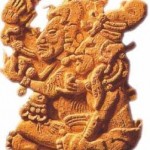“Behold, My Joy is Full”
Click here to listen to Jared Anderson’s podcast on this lesson and to read his lesson notes.
First of all, why do you think chapter 16 is not included in Lesson 39? I will review chapter 16 here and then again in Lesson 40
“Reading Jesus’ sermons in Third Nephi is more like interpreting prophecy rather than following structured arguments or straightforward narrative” (Grant Hardy, Understanding The Book of Mormon: A Reader’s Guide, pg. 201).
16:1-3 “…I have other sheep, which are not…have not as yet heard my voice, neither have I at any time manifested myself unto them.”
Within Mormonism, we usually emphasize our particularism; “the one and only true church,” etc. This scripture speaks to the universalism of religion and those two things, particularism and the universalism of religion, are properly held in tension. How do you interpret verse 2? Does it mean that Jesus hasn’t shown himself to them nor have they heard him physically or is it more metaphysical?
The Gentiles and Scattered Israel: 3 Nephi 16:4-20
16:4-12
“In his study of the relationship between Mormons and Jews, Steven Epperson downplayed this the Book of Mormon teaching that the House of Israel will be brought to a knowledge of Jesus Christ as their Redeemer, observing that ‘The Book of Mormon repeatedly asserts that Israel’s restoration depends on realizing the territorial terms of the covenant not in its conversion to, or identity with, the church.’ It may be that ‘Jewish missions were explicitly rejected by most leaders of the LDS Church and were never part of the church’s program in the nineteenth century,’ but the Book of Mormon is nevertheless clear that eventually Jews will become Christians'” (Grant Hardy, Understanding The Book of Mormon: A Reader’s Guide, pg. 315, note 36)
16:4 “…do not ask the Father…” Why would the people in Jerusalem ask God about the other scattered tribes if they didn’t know about them? Or, is Jesus saying that they know there are scattered tribes, but don’t know what is going on with them? It appears that the resurrected Jesus in Third Nephi is concerned less with conveying precise information than in inviting his listeners, both ancient and modern, to come into a particular sort of relationship with him (ask[ed] the Father in my name) (Hardy, A Reader’s Guide, pg. 212).
16:5, 11-12 It is interesting to note how often Jesus specifies that covenants with Israel were made by the Father. Later he credits the Father with the covenant with Abraham (3 Nephi 20:25,27)
16:10 “sin against my gospel…reject the fullness of my gospel…” Is there any significance in Jesus’ word change?
16:10 “…I will bring the fullness of my gospel from among them…” This is an odd way to put things. Why is it not “taken” from the Gentiles?
16:13 “…if the Gentiles will repent…”
“This opportunity is mentioned at least four times in Third Nephi (3 Nephi 16:13; 21:6, 22; 30:2) and Latter-day Saints take it quite literally. After baptism and confirmation by which they receive the Holy Ghost, they are encouraged to get a blessing from a church patriarch that will among other personal promises and warnings, declare with tribe of Israel they belong to (or perhaps assigned to). Most discover they are affiliated with Ephraim” (Hardy, Reader’s Guide, pg. 315, note 35)
16:20 this scripture is a quote from Isaiah 52:8-10 and is also cited in Mosiah 12:22-24; 15:29-31.
“Usually people cite holy writ when they need to bolster their authority. Jesus, descending from heaven as God, does not need any further proof of his power or legitimacy; it would have been obvious to everyone present on that occasion that his words were scripture. So the effect is just the opposite. He validates the ancient prophets by quoting their writings, thus demonstrating that even the arrival of the Lord himself will not annul or supplant the authority of the scriptures. The resurrected Christ does not just fulfill prophecies; he renews the promise of those that were as yet unrealized” (Hardy, A Reader’s Guide, pg. 202).
Jesus Heals the Sick: 3 Nephi 17:1-10
17:6 “…my bowels are filled with compassion…”
Scriptural talk of bowels descends from ancient patterns of thought that place the emotions in particular internal organs….The ancient terms that the King James translators rendered into English as “bowels” had a long history in Hebrew and Greek. In the Hebrew Bible, three words (rechem, qereb, and me’ah) are translated as “bowels” in the King James Version (KJV). The most important of these, the plural term me’im has a wide semantic range in Biblical Hebrew and can signify the innards generally (not only the intestines), the reproductive organs, and the vital center of emotional life. Referring to Song of Solomon 5:4, biblical scholar Marvin Pope summarizes this usage: me’im “designates primarily the inward parts of the body, the intestines bowels, guts, and is used of the source of procreative powers male and female, of the seat of the emotions, pity, compassion, distress, and here of erotic emotion”. The Hebrew qereb “can represent the inward part(s),” while rechem (more often translated as “compassion”) is closely related to the word racham, “womb”, and thus connotes a deep love grounded in some natural human relationship, especially that of parent and child.
“In classical Greek one term (splangchna a plural term that is cognate to spleen) could mean both the intestines and the edible inner parts of a sacrificed animal, such as the heart, lungs, liver, and kidneys, as well as the location of general character traits in human beings, although not the seat of mercy. In Septuagint and New Testament Greek splangchna took on a more Hebraic color to include tender feelings and mercy. In the Epistles of Paul, for instance, splangchna is used to describe not only the vital organs but also the entire human personality, the body and spirit together. Paul described his deep love for the far away Philippians: “For God is my record, how greatly I long after you all in the bowels of Jesus Christ ” (Philip 1:8). Similarly, in Philemon, Paul wrote on behalf of a beloved slave, Onesimus whom Paul called “mine own bowels” (Philemon 11:2) – meaning someone tied up in his inmost affections or as we might say, a bosom-buddy. (In Latin, viscera could mean “best friend,” just as in somewhat old fashioned modern Greek tzieri mou means both “my dear” and “my liver.”) https://byustudies.byu.edu/PDFLibrary/38.4PetersBowels-b794be80-ba62-4cb3-a9f8-b1f3408cda42.pdf
Jesus Prays and Blesses the Children: 3 Nephi 17:11-2
17:14, 15 “…Father, I am troubled….he prayed unto the Father” With Jesus being fully God, I find this concept of him praying to God the Father quite interesting. It doesn’t bother me – it’s just interesting to think about.
17:19 “…blessed are ye because of your faith….” With God the Son praying with the congregation, how much faith is actually being exercised by the congregation?
17:21, 22 “…he wept…he wept again…” Why is he crying? This reminds me of a scripture in the Pearl of Great Price:
“It came to pass that the God of heaven looked upon the residue of the people, and he wept; and Enoch bore record of it, saying: how is it that the heavens weep, and shed forth their tears as the rain upon the mountains?” (Moses 7:24, 28)
This scripture in Moses first came to my attention because of an essay written by Eugene England titled, “The Weeping God of Mormonism“. Click here to read his amazing essay.
17:21-25 “…Behold your little ones…” These verses are some of the most beautiful that I know of in our LDS canon of scripture; they touch my soul. God the Son blessing children and angels coming to administer to children…absolutely beautiful.
17:24 “…cast their eyes towards heaven…they saw the heavens open…encircled about with fire…minister unto them…” compare with Helaman 5:43, 45, 48 “filled as if with fire…cast up their eyes…they saw the heavens open…angels came down out of heaven and ministered unto them.” There are parallels that Mormon is drawing here.
17:25 “…did bear record…”
“We are told at least eight times that the participants “did bear record” of events during Christ’s visit (see 3 Nephi 11:15; 17:15-17, 21; 18:37, 39; 19:14, 33). The only other portion of the Book of Mormon with this degree of attention to “bearing record” is Nephi’s Vision in 1 Nephi chapters 11-14. There may be a connection here with the recurring observation in Exodus that “all the people” witnessed various miraculous events; see Exodus 19:11, 16; 20:18; 33:10) (Hardy, A Reader’s Guide, pg. 317, note 49).
Jesus Institutes the Sacrament: 3 Nephi 18:1-16
18:1 “…and wine unto him…” I tried to find out if grape cultivation for the use of wine occurred in MesoAmerica, but could find nothing. I did find the following on dictionary.reference.com:
Balche:
(among the Yucatec Maya) a drink made from the bark of a leguminous tree, Lonchocarpus violaceus, which is soaked in honey and water and fermented.
Also found this on the ever-reliable wikipedia (yes I am being sarcastic):
Acan is the Mayan god of wine. His name means ‘belch’. He is identified with the local brew, balche, made from fermented honey to which the bark of the balche tree has been added (Jordan, Michael (July 1993). Encyclopedia of Gods: Over 2,500 Deities of the World. Facts on File. ISBN 978-0-8160-2909-9).
18:7 “…in remembrance of my body, which I have shown unto you…” In the New World, the symbolism of Jesus’ crucified body has been removed. Luke 22:19 “...This is my body which is given for you: do in remembrance of me.”
18:8, 9 No symbolism is attached to the wine. Mark 14:24 “This is my blood of the New Testament, which is shed for many.”
Instead, in these verses the elements of the Sacrament of the Lord’s Supper seem to emphasize one’s willingness to do “…that which [Jesus] has commanded…” (vs. 10). The rite of baptism is also attached to the partaking of Communion (vs.6, 11) .
18:13 compare with 3 Nephi 14:24-27
Instructions to the Multitude on Prayer and Fellowship: 3 Nephi 18:17-25
18:21 How would the meaning be changed if it read, “…unto the Father, always, in my name, that…”?
18:24 compare with 3 Nephi 12:14-16
18:25 “…whosoever breaketh this commandment suffereth himself to be led into temptation.” Of what commandment is he speaking? That we should do as Jesus’ has done? Specifically, to turn none away, “but rather…[all] should come unto [Him]…”?
Instructions to the Twelve on Fellowship: 3 Nephi 18:26-25
18:30, 32 “…ye shall not cast him out from among you…ye shall not cast him out of your synagogues…” In the previous verses, Jesus was speaking to the whole multitude. In these verses, he is repeating the same injunction, but to the ordained apostles.
18:35 ” …I should go unto the Father for your sakes.” Why?
Jesus Departs: 3 Nephi 18:36-39
18:37 “And I will show unto you hereafter that this record is true.” This is an editorial interruption by Mormon that Grant Hardy calls a narrative foreshadowing. See 3 Nephi 26:17; Moroni 2:1-3
[End of Jesus’ First Sermon to the Nephites: 3 Nephi 12:1-18:39]
A Greater Multitude Gathers; the Twelve Are Baptized: 3 Nephi 19:1-14
19:2 see 3 Nephi 17:3
19:4 see 3 Nephi 7:19
19:11-12
“Nephi3 himself had been very actively engaged in baptizing in the years that preceded Jesus’ coming (3 Nephi 1:23; 7:23-26) and he is the first to initiate the new baptisms. We might reasonably ask what authority Nephi now has that he was formerly lacking, or how the ordinance has been transformed. Clearly something has changed, but Mormon does not provide an explanation. Believers and critics alike have rushed to fill the gap, suggesting the re-baptisms were “Christocentric” rather than “penitent” – a distinction that does not exactly hold up in the text – or that they were necessary in light of a newly organized church, or that they represented a renewal of covenants in a new age. Brent Metcalfe, in an article seeking to demonstrate Joseph Smith’s authorship, argued that Christocentric baptisms occurred only in portions of the Book of Mormon that were dictated later (including 2 Nephi), however Matthew Roper has identified a number of counterexamples (Hardy, A Reader’s Guide, pg. 312, note 23).
19:13-14 “…Holy Ghost did fall upon them...filled with…fire…encircled about as if it were by fire…came down from heaven…angels did come down out of heaven and did minister unto them…” Compare the wording here with what is found in Helaman 5:43, 45, 48; 3 Nephi 17:24. “
“The disciples are recapitulating what had happened on the first day to the little children whom Jesus blessed – or indeed what had happened sixty-five years earlier to the Lamanites in the prison with Nephi2 and Lehi4. It is remarkable that within God’s providential design, which includes a hierarchical church organization, there are nevertheless times when children, and even Lamanites, take precedence over God’s chosen ones” (Hardy, A Reader’s Guide, pg. 199)
Third Nephi often amplifies the miraculous aspects of the gospels:
John 20:24-29 3 Nephi 11:13-17; 17:25 Jesus persuaded Thomas by allowing him to touch the wound on his hands and side; at Bountiful he invited twenty-five hundred Nephites to do the same.
Matthew 3:11; Luke 3:16; 3 Nephi 19:13-14 At the Transfiguration, Jesus’ “face did shine as the sun and his raiment was white as the light”; in the New World, this heavenly glow was transferred to his twelve disciples as well: “the light of his countenance did shine upon them…”
Matthew 18:10; Luke 7:9; 3 Nephi 19:35 Jesus said of one Roman centurion, “I have not found so great faith, no not in Israel”; but of the entire Nephite multitude he marveled, “so great faith have I never seen among all the Jews.”
(Hardy, A Reader’s Guide, pg. 181)
Jesus’ Second Sermon to the Nephites: 3 Nephi 19:15-26:14
Jesus Returns and Responds to Their Prayers: 3 Nephi 19:15-36
“There is an echo of Jesus and his disciples at Gethsemane, where he stepped away from them three times to pray, in each instance returning to find that they had fallen asleep. In Bountiful, the same sequence of events is reenacted, but rather than dozing off, his Nephite disciples “pray steadfastly, without ceasing.” Jesus commends them saying, “So great faith have I never seen among all the Jews.” Compare 3 Nephi 19:15-36; Matthew 26:36-46; Mark 14:32-42. (Hardy, A Reader’s Guide, pg. 314, note 33)
19:18, 22, 24 “…and they did pray unto Jesus, calling him their Lord and their God…and they pray unto me; and they pray unto me because I am with them…they did still continue, without ceasing, to pray unto him..” Say what now?
19:24 “…for it was given unto them what they should pray, and they were filled with desire.” Compare with Romans 8:26, 27. With what desire were the Nephites filled?
19:26 “…Pray on; nevertheless, they did not cease to pray.” Why does it say “nevertheless“? Shouldn’t it say, “so, they did not cease to pray”?
19:33 “…did understand in their hearts…”
“In these verses understanding is linked first and foremost to the heart. clearly we must use our minds and our rational capacity; however, we are not explicitly counseled to apply our minds, but our hearts, in seeking for understanding. Perhaps the implication of the scriptures is that reason and “the arm of flesh” (Doctrine and Covenants 1:19) are not sufficient to engender true understanding. The word understanding as used in the scriptures does not refer solely or even primarily to intellectual or cognitive comprehension. Rather, when the Holy Ghost confirms in our hearts as true what we know in our minds, understanding occurs” (Elder David A. Bednar, Increase in Learning – Scriptural Patterns for Obtaining Your Own Answers, pg. 52)








Recent Comments